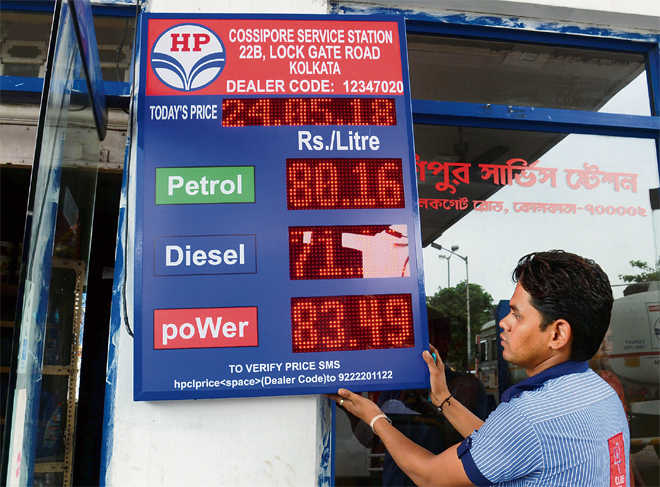
Rising Price: A petrol pump employee adjusts the price board at a fuel station. PTI
SK Khosla
Secretary, Chetna Manch Chandigarh
For the last over 10 days, there has been an unabated rise in the prices of petrol and diesel across the nation and Chandigarh is not the exception. On May 21, the prices of petrol and diesel were Rs 73.93 and Rs 64.86 per litre, respectively.
Although the average basket of oil prices that India imports rose by $3 barrel, the NDA government had not raised the prices at the pump since April 24, thanks to the electoral compulsions ahead of the Karnataka Assembly elections. Just after two days of elections, the government started raising the petrol and diesel prices. The price of the petroleum products has the a cascading effect on the common man.
For instance, the sagging spot rubber market bounced back dramatically this week from Rs 120 per kg to Rs 127 per kg and similar is the fate of a large number of other products.
Briefly, the following factors are pushing up crude oil prices:
- US sanctions on Iran
- Political crisis in Venezuela
- Instability in Libya and Iraq
- Imminent public offering of Saudi Arabia-owned oil company Aramco
- Lower supply from US shale oil basins
- Increasing growth in demand from emerging markets.
Fortunately for India, its oil imports from Iran will not be affected by the US sanctions against the West Asian country.
Besides, taxes are around 100 per cent of the "base price" and both the Union and the state governments have calculatedly kept petroleum products outside the GST purview and treat the two auto fuels as milch cow. This unusual rise which makes retail prices of petroleum products in India the highest in South Asia is principally on account of the tremendous hike in mopping up revenues by the Union government through excise duties. The higher crude prices would not impact the Centre's fiscal deficit much; it could have implications for the current account deficit and inflationary trend of economy in the country.
In the last four years, from April 1, 2014, the excise duty on petrol has gone up from Rs 9.48 per litre to Rs 19.48 per litre as of now. This amounts to a hike of 105 per cent and 47.4 per cent of the retail price is going to the tax revenue collection. Similarly, the excise duty on diesel which was Rs 3.56 per litre on April 1, 2014 has now gone up to Rs 15.33 per litre. This again amounts to an increase of 330 per cent, while 38.09 per cent of the retail price is going to tax. Local levies on fuels vary from state to state.
The following could be the solution and help reduce the oil prices:
1 Permanent solution to this problem, however, lies in the inclusion of auto fuels under the GST. This move will unify cap taxes on petrol and diesel at a maximum of 28 per cent. However, this may not be possible, considering the BJP is in power in about 20 states. When it was the main national Opposition, the BJP made much of high fuel prices.
2 Instead of mopping benefits of low oil prices to achieve fiscal deficit targets, the government should create a price stabilisation fund to protect consumers from the highly volatile international oil market.
3 Rising oil prices and the strengthening of dollar are a cause of serious concern although India's foreign exchange reserves are still at a healthy $417 billion.
4 It also affects the current account of the government in another way. When oil prices fell, it increased the duties on fuel and used the revenue from this to strengthen its own finances, keeping the fiscal deficit under control. The government has an internal target for oil prices above which it may cut excise duties on petrol and diesel to ease the burden on consumers.
5 At the same time, the states can also play their part by reducing their VAT on fuel. With excise duty, states get 42 per cent of collections through devolution.
6 Apart from all this, the government can take measures like rationing petroleum products, cut in consumption in government vehicles which are ruthlessly using this gold liquid to cut demand for crude. Also, public transport needs to be strengthened.
On the one hand, people are being burdened with excise duty raised from time to time and on the other hand, the Union government willingly allows lakhs of crores of rupees as tax waivers to top corporates of the country.
Still, the government is reluctant to slash the prices, but unless swift action is taken to address the situation, economics of growth will head towards a speed-breaker which may be a serious challenge before the nation.



























